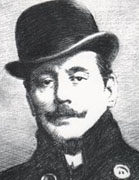A Selection from Puccini's letters

November 20, 1900, To: Guilio Ricordi
... The more I think of Butterfly the more irresistibly am I attracted. Oh, if only had it here, that I might set to work on it! I think instead of one act I could make two quite long ones: the first in North America and the second in Japan. Illica could certainly find in the novel everything that is wanted.
I do not understand how Mr Maxwell [Ricordi' representative in New York] has still not answered.
April 23, 1902, To: Giulio Ricordi
My dear Signor Giulio,
And so, Hosanna! We must shout it open-throated (if it is true)! I awaited the arrival of the fruit of the great travail, part of a toilsome structure whose completion is still remote. For my part, I am laying stone on stone and doing my best to make Mr F.B. Pinkerton sing like an American.
... Illica writes me to interview that Japanese [actress] Sada Jacco. If you think it worth while I could take a run over to Milan when she comes. But an interpreter will be necessary; she is sure to speak some European language. Please put me down for two shares in the Scala.
May 3, 1902, To: Giulio Ricordi
...I am working (and glad of it) at Act I, and am getting on well. I have composed the passage for the entry of Butterfly, and I am pleased with it
Apart from the fact that they are slightly Italian in character, both the music and the whole scene of this entry are very effective. I am going slowly, as usual, but working carefully and with deliberation.
[no date], To: Giulio Ricordi
My dear Signor Giulio,
I have had a visit today from Mme Oyama, wife of the Japanese Ambassador.
She told me many interesting things and sang some native songs to me. She
has promised to send me some native Japanese music. I sketched the story of
the libretto for her, and she liked it, especially as just such a story as
Butterfly's is known to her as having happened in real life.
She does not approve of the name Yamadori, on the ground that it is feminine and otherwise not appropriate; because in Japan they are accustomed in their plays to use names which suggest, or are suitable to, the various types and characters. The uncle's name of Yaxonpidè is wrong too. Similarly the names Sarundpiko, Izaghi, Sganami, etc. are all wrong. Mme Oyama is at Viareggio, where I shall go to see her and takes notes of what she sings to me, She is very intelligent and, although plain, is attractive.
[no date], To: Giulio Ricordi
... The wife of the Japanese Ambassador has called upon me again several times. She has written to Tokyo for some folk songs, but it will be three months before I can have them! They will be useful for the other scenes.
November 16, 1902, To: Giulio Ricordi
My dear Signor Giulio,
For two days I have been in an absolutely miserable state of mind. Why? Because
the libretto, as it stands, is not good from the end of Act II onwards, and
the realization of this has been very painful. Now, however, I am convinced
that the opera must be in two acts! Don't be frightened!
The Consulate was a great mistake. The action must move forward to the close without interruption, rapid, effective, terrible! In arranging the opera in three acts I was making for certain disaster. You will see, dear Signor Giulio, that I am right.
[no date], To: Giulio Ricordi
... If you only knew how I am racking my brains! The work to be done is not great, but it is essential to bind the whole story together with a closer logic than there is in Belasco's play.
February 17, 1904 [the day of the first performance at La Scala], To: Rosina Storchio [the soprano who sang the part Cio-Cio-San]
Dear Rosina,
My good wishes are superfluous! So true, so delicate, so moving is your great
art that the public must succumb to it. And I hope that through you I am speeding
to victory. Tonight then - with sure confidence and much affection, dear child.
[After the disastrous performance, Rosina Strochio swore that she would never sing Madama Butterfly again in Italy]
February 22, 1904, To: Rosina Storchio
... And so, my Butterfly, the love-sick maiden, would leave me. You seem in your departure to be taking away the best, the most poetical part of my work. I think that Butterfly without Rosina Storchio becomes a thing without soul. What a shame! After so many anxious fears, after pouring out such riches of your keen and delicate intelligence, to receive the reward of brutality. What a disgrace it was! But I am sure that this horrible impression will soon be wiped out of our minds, and so, with warm affection and confidence in the future, I wish you good luck.
May 4, 1904, To: Rosina Storchio
Dear Rosina [Storchio]
I leave here today for Brescia. May God give me good fortune. I think of you
so much. I am always seeing you in your charming presentment of Butterfly
and hearing again the sweet little voice which has such a sure way to the
heart.
June 11, 1904 To: [his sister] Dide
Dear Dide,
It went exactly as I had wished: a real and unqualified triumph; the success
is greater every evening.
November 14, 1906, To: [his sister] Nitteti
... Butterfly continues her triumphal career: Washington, Baltimore, Boston, and yesterday New York - always in English. In January I am going to New York for Manon [by Massent], Butterfly, Tosca, and then Butterfly in Italian at another theater, the great Metropolitan.
But first I shall return to Italy if only for a few days. I have to come, besides, for clothes. I must get a fur-lined coat because it is very cold in New York.